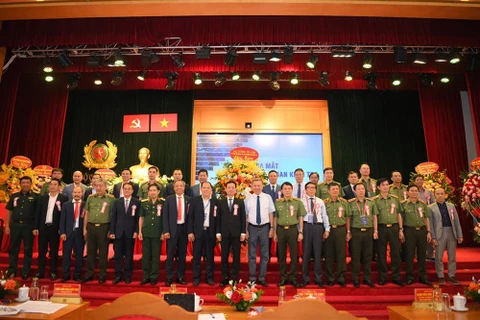Hanoi (VNA) – The Authority of Information Security (AIS) under the Ministry of Information and Communications (MIC) and the global cybersecurity company Kaspersky held a workshop themed “Cyber Immunity for Security in IoT” in Hanoi on September 12 in recognition of the complex cybersecurity landscape brought about by the proliferation of IoT devices.
The annual workshop, part of long-term cooperation activities between the two sides, aimed for technical exchange and thought leadership
A report by the Vietnam Computer Emergency Response Teams (VNCERT) indicates a substantial uptick in cyber incidents targeting IoT devices in the past years, and from the beginning of last year, the AIS has forecasted that attacks on IoT devices will be one of four main trends in cyberattacks in the country.
As the number of IoT devices grows exponentially, the installation of protective tools that need regular updates on each of them is time-consuming and resource-intensive.
The problem is compounded by many of these devices not having the processing capacity for cybersecurity add-on tools such as antivirus software.
This problem is especially pertinent to Vietnam, with its fast-evolving interconnected landscape.
The burgeoning reliance on IoT coupled with these vulnerabilities underscores the need for Cyber Immunity – a Kaspersky trademark approach that embodies the secure-by-design approach which helps tackle cybersecurity vulnerabilities in the very early stages of software development.
To operationalise the vision of Cyber Immunity, Kaspersky developed its own operating system – KasperskyOS.
Genie Gan, Head of Government Affairs & Public Policy for Asia-Pacific, Japan, Middle-East, Turkey, and Africa at Kaspersky, said: “IoT devices bring about a complex cybersecurity environment consisting of a large number of disparate digital elements, which introduces more points of vulnerability that cybercriminals can potentially attack. We believe Cyber Immunity offers a new paradigm for how IT systems should be designed. Vietnam, with its technology-savvy population, and high IoT adoption rate, offers the perfect setting for Cyber Immune solutions to be introduced”.
Deputy Director General Tran Dang Khoa commented on the significance of the event: “We are glad that Kaspersky has continued its longstanding collaboration with the Vietnamese government, and has offered actionable solutions to address real challenges brought about by the proliferation of IoT devices”.
The workshop had provided critical insights to attendees from both the government and the private sector, who had been inspired to rethink the foundations for the next generation of IoT security solutions, he added.
The workshop was attended by about 200 representatives from Vietnamese government agencies at the central and provincial levels, academic and research institutes, associations and businesses.
During the workshop, attendees were equipped with insights into IoT, its associated threats, solutions centred around Cyber Immunity, and interactive sessions with government and industry leaders./.
The annual workshop, part of long-term cooperation activities between the two sides, aimed for technical exchange and thought leadership
A report by the Vietnam Computer Emergency Response Teams (VNCERT) indicates a substantial uptick in cyber incidents targeting IoT devices in the past years, and from the beginning of last year, the AIS has forecasted that attacks on IoT devices will be one of four main trends in cyberattacks in the country.
As the number of IoT devices grows exponentially, the installation of protective tools that need regular updates on each of them is time-consuming and resource-intensive.
The problem is compounded by many of these devices not having the processing capacity for cybersecurity add-on tools such as antivirus software.
This problem is especially pertinent to Vietnam, with its fast-evolving interconnected landscape.
The burgeoning reliance on IoT coupled with these vulnerabilities underscores the need for Cyber Immunity – a Kaspersky trademark approach that embodies the secure-by-design approach which helps tackle cybersecurity vulnerabilities in the very early stages of software development.
To operationalise the vision of Cyber Immunity, Kaspersky developed its own operating system – KasperskyOS.
Genie Gan, Head of Government Affairs & Public Policy for Asia-Pacific, Japan, Middle-East, Turkey, and Africa at Kaspersky, said: “IoT devices bring about a complex cybersecurity environment consisting of a large number of disparate digital elements, which introduces more points of vulnerability that cybercriminals can potentially attack. We believe Cyber Immunity offers a new paradigm for how IT systems should be designed. Vietnam, with its technology-savvy population, and high IoT adoption rate, offers the perfect setting for Cyber Immune solutions to be introduced”.
Deputy Director General Tran Dang Khoa commented on the significance of the event: “We are glad that Kaspersky has continued its longstanding collaboration with the Vietnamese government, and has offered actionable solutions to address real challenges brought about by the proliferation of IoT devices”.
The workshop had provided critical insights to attendees from both the government and the private sector, who had been inspired to rethink the foundations for the next generation of IoT security solutions, he added.
The workshop was attended by about 200 representatives from Vietnamese government agencies at the central and provincial levels, academic and research institutes, associations and businesses.
During the workshop, attendees were equipped with insights into IoT, its associated threats, solutions centred around Cyber Immunity, and interactive sessions with government and industry leaders./.
VNA
























